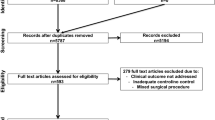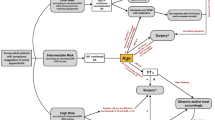Abstract
Background
There is wide variation in the quality of care of hospitalized patients with inflammatory bowel disease (IBD). Prior studies have demonstrated that a specialized inpatient IBD service improves short-term outcomes. In this study, we assessed the impact of a dedicated IBD service on the quality of care and long-term outcomes.
Methods
This retrospective cohort study included adult patients admitted for a complication of IBD between March 2017 and February 2019 to a tertiary referral center. In March 2018, a dedicated inpatient IBD service co-managed by IBD gastroenterologists and colorectal surgeons was implemented. Quality of care outcomes included C. difficile stool testing, confirmed VTE prophylaxis administration and opiate avoidance. Long-term outcomes were clinical remission, IBD-related surgery, ED visits, and hospital readmissions at 90 days and 12 months.
Results
In total, 143 patients were included; 66 pre- and 77 post-implementation of the IBD service. Fifty-two percent had ulcerative colitis and 48% had Crohn’s disease. After implementation, there was improvement in C.difficile testing (90% vs. 76%, P = 0.04), early VTE prophylaxis (92% vs. 77%, P = 0.01) and decreases in narcotic use (14% vs. 30%, P = 0.02), IBD-related ED visits at 90 days (7% vs 18%, P = 0.03) and 12 months (16% vs 30%, P = 0.04), and IBD readmissions at 90 days (16% vs. 30%, P = 0.04). There were no differences in rates of clinical remission or surgery.
Conclusions
The creation of a dedicated inpatient IBD service improved quality of IBD care and reduced post-discharge ED visits and readmissions and broader implementation of this strategy may help optimize care of hospitalized IBD patients.
Similar content being viewed by others
References
van Langenberg DR, Simon SB, Holtmann GJ, Andrews JM. The burden of inpatient costs in inflammatory bowel disease and opportunities to optimize care: a single metropolitan Australian center experience. J Crohns Colitis. 2010;4:413–421.
Ma C, Smith M, Guizzetti L, et al. Assessing national trends and disparities in ambulatory, emergency department, and inpatient visits for inflammatory bowel disease in the United States (2005–2016). Clin Gastroenterol Hepatol. 2020;18:2500–2509.
Kappelman MD, Rifas-Shiman SL, Porter CQ, et al. Direct health care costs of Crohn’s disease and ulcerative colitis in US children and adults. Gastroenterology. 2008;135:1907–1913.
Nguyen GC, Murthy SK, Bressler B, et al. Quality of care and outcomes among hospitalized inflammatory bowel disease patients: a multicenter retrospective study. Inflamm Bowel Dis. 2017;23:695–701.
Ananthakrishnan AN, McGinley EL, Binion DG. Does it matter where you are hospitalized for inflammatory bowel disease? A nationwide analysis of hospital volume. Am J Gastroenterol. 2008;103:2789–2798.
Kaplan GG, McCarthy EP, Ayanian JZ, Korzenik J, Hodin R, Sands BE. Impact of hospital volume on postoperative morbidity and mortality following a colectomy for ulcerative colitis. Gastroenterology. 2008;134:680–687.
Murthy SK, Steinhart AH, Tinmouth J, Austin PC, Nguyen GC. Impact of gastroenterologist care on health outcomes of hospitalised ulcerative colitis patients. Gut. 2012;61:1410–1416.
Nguyen GC, Nugent Z, Shaw S, Bernstein CN. Outcomes of patients with Crohn’s disease improved from 1988 to 2008 and were associated with increased specialist care. Gastroenterology. 2011;141:90–97.
Berry SK, Melmed GY. Quality indicators in inflammatory bowel disease. Intest Res. 2018;16:43–47.
Melmed GY, Siegel CA. Quality improvement in inflammatory bowel disease. Gastroenterol Hepatol (NY). 2013;9:286–292.
Fiorino G, Lytras T, Younge L, et al. Quality of care standards in inflammatory bowel diseases: a European Crohn’s and Colitis Organisation (ECCO) position paper. J Crohns Colitis. 2020;14:1037–1048.
Lewin SM, McConnell RA, Patel R, Sharpton SR, Velayos F, Mahadevan U. Improving the quality of inpatient ulcerative colitis management: promoting evidence-based practice and reducing care variation with an inpatient protocol. Inflamm Bowel Dis. 2019;25:1822–1827.
Law CCY, Sasidharan S, Rodrigues R, et al. Impact of specialized inpatient IBD care on outcomes of IBD hospitalizations: a cohort study. Inflamm Bowel Dis. 2016;22:2149–2157.
Sc T, Witt LJ. Cortisone in ulcerative colitis: preliminary report on a therapeutic trial. BMJ. 1954;2:375–378.
Mao EJ, Hazlewood GS, Kaplan GG, Peyrin-Biroulet L, Ananthakrishnan AN. Systematic review with meta-analysis: comparative efficacy of immunosuppressants and biologics for reducing hospitalisation and surgery in Crohn’s disease and ulcerative colitis. Aliment Pharmacol Ther. 2017;45:3–13.
Axelrad JE, Shah BJ. Clostridium difficile infection in inflammatory bowel disease: a nursing-based quality improvement strategy. J Healthc Qual. 2016;38:283–289.
Tinsley A, Naymagon S, Enomoto LM, Hollenbeak CS, Sands BE, Ullman TA. Rates of pharmacologic venous thromboembolism prophylaxis in hospitalized patients with active ulcerative colitis: results from a tertiary care center. J Crohns Colitis. 2013;7:e635–e640.
Cohen-Mekelburg S, Rosenblatt R, Gold S, et al. The impact of opioid epidemic trends on hospitalised inflammatory bowel disease patients. J Crohns Colitis. 2018;12:1030–1035.
Long MD, Barnes EL, Herfarth HH, Drossman DA. Narcotic use for inflammatory bowel disease and risk factors during hospitalization. Inflamm Bowel Dis. 2012;18:869–876.
Dalal RS, Palchaudhuri S, Snider CK, Lewis JD, Mehta SJ, Lichtenstein GR. Exposure to intravenous opioids is associated with future exposure to opioids in hospitalized patients with inflammatory bowel diseases. Clin Gastroenterol Hepatol. 2019;18:2269–2278.
Docherty MJ, Jones RCW, Wallace MS. Managing pain in inflammatory bowel disease. Gastroenterol Hepatol (NY). 2011;7:592–601.
Nguyen NH, Koola J, Dulai PS, Prokop LJ, Sandborn WJ, Singh S. Rate of risk factors for and interventions to reduce hospital readmission in patients with inflammatory bowel diseases. Clin Gastroenterol Hepatol. 2020;18:1939–1948.
Micic D, Gaetano JN, Rubin JN, et al. Factors associated with readmission to the hospital within 30 days in patients with inflammatory bowel disease. PLoS ONE. 2017;12:e0182900.
Cohen-Mekelburg S, Rosenblatt R, Wallace B, et al. Inflammatory bowel disease readmissions are associated with utilization and comorbidity. Am J Manag Care. 2019;25:474–481.
Dalal RS, Palchaudhuri S, Snider CK, et al. A multimodal intervention using nonopioid analgesics is associated with reduced intravenous opioid exposure among hospitalized patients with inflammatory bowel diseases. Am J Gastroenterol. 2020;115:1474–1485.
Author information
Authors and Affiliations
Corresponding author
Ethics declarations
Conflict of interest
Simon J. Hong, Janice Jang, Dana R. Berg, Tarik Kirat and Feza Remzi have no disclosures. Shannon Chang has served as a consultant for Pfizer, Shire, and Oshi Health. Lisa B. Malter has received educational or IBD fellowship education grants from AbbVie, Gilead, Janssen Pharmaceuticals, Merck & Co., Inc, Pfizer, Prometheus, Laboratories, Takeda, and UCB. Jordan A. Axelrad has received research support from BioFire Diagnostics and has served as a consultant for BioFire Diagnostics and Janssen Pharmaceuticals. David P. Hudesman has received research support from Pfizer and has served as a consultant for Abbvie, BMS, Janssen, Takeda, Pfizer, and Samsung.
Ethical approval
This study was approved by the Institutional Review Board at NYU Langone Health.
Additional information
Publisher's Note
Springer Nature remains neutral with regard to jurisdictional claims in published maps and institutional affiliations.
Electronic supplementary material
Below is the link to the electronic supplementary material.
Rights and permissions
About this article
Cite this article
Hong, S.J., Jang, J., Berg, D. et al. Implementation of an Inpatient IBD Service Is Associated with Improvement in Quality of Care and Long-Term Outcomes. Dig Dis Sci 66, 3753–3759 (2021). https://doi.org/10.1007/s10620-020-06749-7
Received:
Accepted:
Published:
Issue Date:
DOI: https://doi.org/10.1007/s10620-020-06749-7




